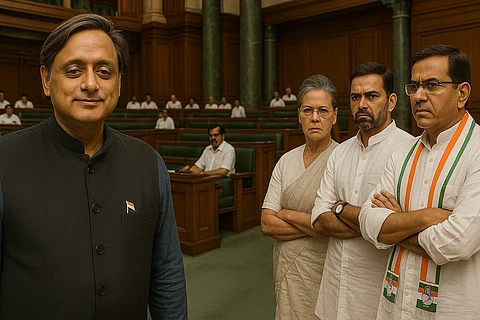
- Home
- न्यूजग्राम
- NewsGram USA
- India
- World
- Politics
- Entertainment
- Culture
- Lifestyle
- Economy
- Sports
- Sp. Coverage
- Misc.
- NewsGram Exclusive
- Jobs / Internships

Shashi Tharoor declined to speak in Parliament against Operation Sindoor.
Tharoor’s refusal exposed deeper ideological rifts within Congress
The ruling NDA used the parliamentary debate to highlight the success of Operation Sindoor.
The ongoing Monsoon Session of Parliament has turned into a high-stakes debate, with the recent Pahalgam terror attack and India’s swift military retaliation under Operation Sindoor dominating proceedings. Both the ruling NDA and the Opposition have fielded prominent leaders to voice their positions in the Lok Sabha and Rajya Sabha. In the Lok Sabha, Defence Minister Rajnath Singh led the government’s charge, while Congress put forward Deputy Leader Gaurav Gogoi to open the Opposition’s response.
However, what truly drew attention was the notable absence of senior Congress MP Shashi Tharoor from the list of speakers.
Shashi Tharoor has reportedly refused to participate in this crucial Lok Sabha debate on the military operation, citing that he did not want to contradict his previously stated views. The debate is focused on the government’s cross-border military response to the terrorist attack in Jammu & Kashmir—Operation Sindoor—which has triggered political tensions within the Opposition, particularly inside the Congress party.
According to party sources, the Congress leadership—including the Leader and Deputy Leader of the Opposition in the Lok Sabha—had requested Tharoor to speak during the special 16-hour session. However, he is said to have declined, making it clear that he could not align with the party’s critical stance against the government’s handling of the situation. Tharoor had earlier called the operation a success, and he was unwilling to speak against his own public statements.
This refusal has added to growing speculation about an ideological divide between Shashi Tharoor and the Congress leadership. In the past, Tharoor had led a multi-party parliamentary delegation to international capitals, including Washington D.C., where he briefed foreign governments and stakeholders on India’s counter-terrorism actions. His public praise for Operation Sindoor and the government’s swift military response drew criticism from within Congress and created visible friction.
Sources inside the party said that one reason the leadership wanted Tharoor to speak was to showcase internal democracy—that even differing voices within Congress were being given space. It was also meant to avoid the perception of division in the party. But Tharoor’s firm refusal made it clear that he would not participate in what he viewed as performative messaging that went against his own beliefs.
When he arrived at Parliament on the day of the debate, Tharoor refused to speak to the media, saying only “Maunvrat, Maunvrat” (meaning “vow of silence”), despite the Congress issuing a three-day whip asking all its MPs to attend and support the party’s official stand.
The discomfort over Tharoor’s independent position has been growing for months. His acceptance of the government’s offer to lead the international parliamentary delegation—while other senior Congress leaders were bypassed—added to the internal unease. His public comments, especially comparing Operation Sindoor favourably against previous military actions under earlier governments, were seen by some Congress members as crossing a “red line.” (Laxman Rekha)
The tensions go back even further. Tharoor was part of the group of internal dissenters (the so-called “G-23”) who openly questioned the Congress leadership’s decisions following poor election results. He also contested the Congress president’s post in 2022, challenging the leadership-backed candidate, which further distanced him from the party high command.
Despite all this, Shashi Tharoor has consistently said that he remains loyal to Congress and its core ideology. He has denied any plans to quit the party or join another. According to him, disagreeing with the party line does not mean he is disloyal. He says his praise for the government’s military action is based purely on national interest, not political gain.
Even so, his silence during this major debate has been widely interpreted as a symbol of the deeper conflict within Congress—especially around how to manage dissent without appearing divided. While other top opposition leaders spoke during the session, the absence of one of India’s most internationally known MPs was highly noticeable.
The ruling BJP-led NDA alliance used the debate to highlight the efficiency and precision of Operation Sindoor. Senior ministers in charge of defence and foreign affairs presented a strong case for the government. On the other hand, Congress and other Opposition parties questioned intelligence lapses and raised concerns about the broader foreign policy implications of such military responses.
As the Monsoon Session continues, Tharoor’s decision has left behind serious questions about the Congress party’s ability to balance internal voices, maintain party discipline, and still project unity at a time when the Opposition is trying to challenge the ruling bloc's dominance. [Rh/VP]
